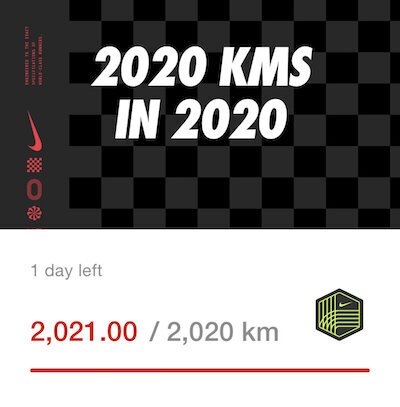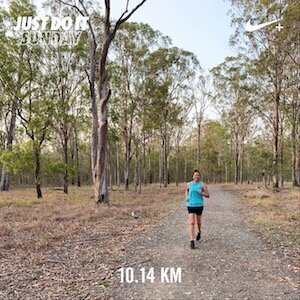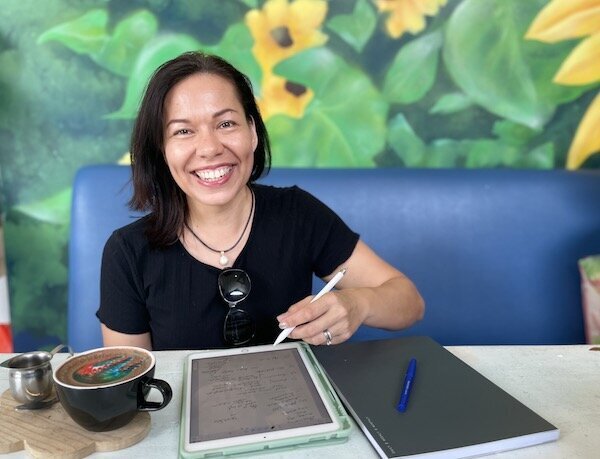How constructive delusion can drive your new 2021 habit: 7 lessons learnt from my 2020kms running challenge)
While the world was falling apart, and the 2020 Olympic-alternative leaderboard was the daily global Covid stats, the one thing I knew I could control, was creating the space to step out for a run on the daily.
I finally finished running 2020kms today, 30 December 2020. While most people are wishing for 2020 to be over, I was praying for more days in the calendar. I rejoiced that it was a leap year, so I had an extra day. You could say that I timed my challenge completion beautifully, however behind the scenes it's been a chaotic, mad dash to the metaphorical finish line.
I’m so grateful for this challenge and see the magic in having an annual goal (not resolution!) that requires you to tick things off a visual shoot on the daily. While my legs never want to contact a foam roller (they're that tight), I've learnt/confirmed key seven things about habit-forming behaviours that may be useful to you as we lead into a new year.
Here they are:
You don't need long lead-up time to create your new habit
Use tools that already exist to make it even easier to setup
It’s all in the name: Call your NEW HABIT OR CHALLENGE SOMETHING COOL
You don't need the masses. Power + group accountability can come with tiny numbers.
Your challenge probably isn't the real challenge.
Make it public. Make it visual.
Lead into your challenge with constructive delusion.
Lesson One: You don't need long lead-up time to create your new habit
I was lounging in a Gold Coast AirBNB on 28 December, 2019 when my sister, Theresa, who was scrolling through social media said:
“Hey, there’s this group of people running 2020kms next year!”
I immediately sat up right in my seat. Gawd, I loved the sound of that! How compelling. I quickly took out my phone’s Calculator app, and did the math.
2020kms / 52 weeks = 39 kms/week.
Or, 2020kms / 365 = 5.53kms/day.
That sounded pretty achievable. The group running the challenge used Garmin to track their stats. I’m a Nike + Club runner (have been for the last six years), so I wasn’t going to switch.
I started my own 2020km challenge in the NikeApp. It took 20 seconds to set-up. All I did was complete these two questions:
Distance? 2020kms
Time-frame? 1 Jan 2020 - 31 Dec 2020.
I put the call-out on social media, and found 14 other people keen to start. We connected on the Nike+ app, created a Facebook group, and the running banter began.
Lesson Two: Use tools that already exist to make it even easier to setup
I wish the actual running part of this was easier than the setup!
I started this challenge because I had kinda lost my mojo for running. I was still getting out there, but wasn’t feeling the love. After living in Broome and running on Cable Beach every day, the streets of Brisbane just weren’t enticing, so I needed something to grab me back and compel me to wake up in the morning, and take those strides out the door.
That's my first lessons from from running (excuse the deliberate pun) a group 2020kms challenge this year: Make starting your challenge the easiest thing to do.
Keep it simple by using tools that already exist - in our case, the Nike app and Facebook groups.
Lesson Three: It’s all in the name: Call your new-formed habit something cool.
What attracted me to this challenge the most? The name of it. Running 2020kms in 2020 is juicy. The hashtag was catchy, #2020kms.
It was a great conversation starter, too. You didn’t really need to explain it, when you tell people you’re running 2020kms, they get it (“It is what it is”!).
What a great name can do is, market what you're doing to the most important person involved in it: Yourself.
I think this is something often overlooked. We want to do something different, "I want to write more!", "I want to drink less!" - well, so does everyone else out there.
What can you do that stands out, that makes it more exciting? Call it something cool.
Not only is it more attractive to participate in but others remember it as well. I often had people connect and check-in on my 2020kms challenge because it was a memorable challenge.
Lesson Four: You don't need the masses. Power + group accountability can come WITH TINY numbers.
Don't spend your energy convincing others to join you on your challenge. You don't need that many people involved with your group challenge to make it worthwhile.
The name and purpose behind your challenge should reel the right people in right away.
A challenge is a stretch and it can lose its glitz pretty quickly. If your friend's are resisting joining, it's not up to you to convince them.
We started the challenge with 12 people signed up. During the upheaval of 2020, quarantine, injury and just life, our numbers dropped down to three active participants.
Thanks to Michelle Scally and Alice Hutton for keeping the pace, and also to those of who joined in early and brought the momentum and enthusiasm required to kick this off!
Lesson Five: Your challenge probably isn't the real challenge.
I love how one of Michael Bungay Stanier's 7 coaching questions is, "What's the real challenge here?" We often assume the real challenge is the one staring us in the face. For me, running wasn't the real challenge.
The real challenges were:
Getting enough sleep, to fuel the run the next day.
Working around travel schedules and forecasting dates/times to sneak in those runs
Making rest + recovery a priority, even though I needed to get out there to clock more kms (this was the hardest part - I ended up changing my strategy and running more slowly, so injury didn't become a factor)
Keeping the Apple Watch charged, so that it could track the runs
Sacrificing other forms of exercise, to just keep running (can't wait to get back into HIIT in 2021).
Lesson Six: Make it public. Make it visual.
Love a bit of public accountability and the Nike+ Run Club does that, it automatically syncs your run, and you can then share the run over on Instagram.
Visual boards are often used in business life to capture trends, percentages, incidents. The Nike+ app leaderboard captured this easily. The integration with Instagram allows me to share the run of the day.
When planning my new habit for next year, one thing I'm trying to figure out is how to make it more visual. I've discovered this neat Google Sheet template which I'll setup for my next writing group challenge (send me a message, or email me: hello@leannehughes.com if you'd like to join!)
Lesson Seven: Lead into your challenge with constructive delusion.
Constructive delusion. I picked up this phrase from one of my favourite This American Life episodes called 129: Cars. The phrase is used to describe one of the top three attributes of the most successful salesman at the dealership, Jason Mascia.
5.53kms/day seemed pretty achievable to us all.
What I hadn’t factored in through my delusion, was the the consequence of skipping a day of running. If you skipped one day of running, you needed to run 11kms the next day to maintain your 5.53kms/day average.
That 5.53kms/day average didn't last long at all. In March, my average moved up to 6kms/day. This month, I've had to run 10kms/day to make the target!
That phrase, "The biggest time-saving device of today, is tomorrow" rang true during this challenge.
I saw the daily average move up but had this constant faith that I would still get there in the end. Sure, I'd suffer a bit later on!
The funny thing about my approach to this challenge, is it’s exactly how I approach so many other things in my life. I’ll do a bit of work here and there, but it’s only through an impending deadline that I’ll rise to the challenge. I could have easily stacked up extra kms, particularly in winter, but I just kept to pace.
Why would I recommend being a part of an annual group challenge?
I know it's corny but the end goal isn't that exciting, it's all about the person you become on your journey.
My friend Camilla asked how I'd celebrate running 2020kms. My response was that I'd probably just share a photo on Instagram, have a glass of champagne with Alice, and move on with life.
The true joy of this challenge was the journey it took me on this year.
With so much uncertainty in 2020, the challenge kept me focused on what I could do every day, that I could make progress on. I was fortunate to live in Brisbane and not suffer lockdowns.
I fell back in love with running. Yes!
I formed a solid habit. When I opened my eyes every morning, the immediate thought was, "Get on your shoes. Go for a run". Now when I don't run, I feel like I haven't woken up properly. That's pretty cool
The habit starts the night before - there's real magic in just laying out your clothes
Creating new Spotify playlists / curated podcast playlist built the anticipation of the daily run
I liked that I could adapt my running schedule, depending on what I had going on in my life. For the first three months of the year, I was travelling to Port Moresby, and I had to work around that, including treadmill running (which I hate, even though the view from The Airways Hotel is stunning).
What’s on for next year?
About the author: Leanne Hughes
Leanne Hughes is an international facilitator, speaker and coach who loves creating unpredictable workshop experiences, that predictably work.
She combines her experience in Marketing, with her education in Human Resources and Psychology, to help leaders create engaging everyday experiences - that are so contagious they scale across teams, functions and regions.
Leanne has facilitated leadership, onboarding and team-development workshops across Australia, Canada, Hong Kong, India, Indonesia, Mongolia, Singapore and believes in a strengths-centred approach to learning and development. She has over 13 years’ of experience across a range of industries including mining, government and tourism sectors.
She’s the host of the First Time Facilitator podcast and was a finalist in the 2018 Australian Learning Impact awards for Learning Professional of the Year.







